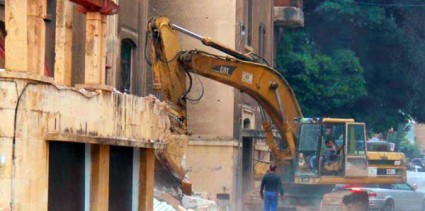
Picture taken from TheBeirutSpring
A nice read by Journalist Ana Maria.
Amin Maalouf brought me to Lebanon. I first read Samarkand. I couldn’t leave the book until I was done with the last page. Then I let myself conquered by the nostalgia and the regrets in “Les Echelles du Levant”. Then I picked up “The Crusades seen by the Arabs.” But it wasn’t until I read “The Rock of Tanios” than I fell in love with Maalouf’s Lebanon.
I had covered the war in 2006 in Lebanon, I wrote news about the Arab Israel conflict, I knew about the politics of Lebanon you see every day on the newswires and in the international media. There is a Lebanon in Robert Fisk’s “Pity the Nation” that brings young Western journalists to Beirut.
But there is a Lebanon Maalouf immortalized in his books which is the real Lebanon, the soul of Lebanon beyond war and vice. That archetypal Lebanese mountain village painted with words in “The Rock of Tanios” made me come to Lebanon and live here.
Tanios’s story made me go up to Baskinta in 2009 and look for Maalouf’s house. I wanted to see that Kfaryabda I had read about in the book. The name is not real, but the village itself exists. The book is based on an old story that happened long ago in a village close to Baskinta, Kfrar Aqab, where Amin Maalouf used to spend his summers. The village is extinct, but the legend of the murder of a 19th century Maronite Patriarch that happened there and that of the man hanged for the killing still haunted the place.
It was summertime sunset in 2009 when I reached there and I was lucky. The house is usually empty, but on the terrace was Maalouf’s mother, his sisters and his 7 year old niece. The women were surprised to see me and to hear my reason for disturbing their afternoon tea. But they soon started telling me how they had just gotten rid of 35 guests, practically the entire family. They were on a three week vacation in Lebanon, the yearly vacation, they said. “We left Lebanon in 1985, in fact. Amin lives in France now,” one of his sisters said while showing me the view from the balcony. I told her that I knew already, but I just wanted to see the village and the house.
She then starts the story of the place, insisting on how the Syrian army took over the house and turned it into a headquarters during the civil war, how the soldiers destroyed the one and a half century old furniture and how the books disappeared, how the house was robbed several times. “Now we just have a very- very small library,” she said. “Amin will not believe his ears when I tell him about you. When you come to Paris, look for him,” she said as I was leaving, offering me a marzipan cookie.
I haven’t been to Paris ever since and I wouldn’t have bothered the writer anyway. I still have the marzipan cookie in the fridge. Seeing the Maalouf family house in Beirut being destroyed made me very sad. “The Rock of Tanios” is for Lebanon what Zorba is for Greece. But the Greeks did not demolish Nikos Kazantzakis’ house in Crete. They turned it into a museum next to Iraklion county capital. The Lebanese government, however, has no conscience. [Source]










Loved how the journalist put those words together to describe a legend
it’s funny how foreigners value our heritage more than we do… I wonder what Ghassan Salame would have done if he had still been the Minister of Culture…